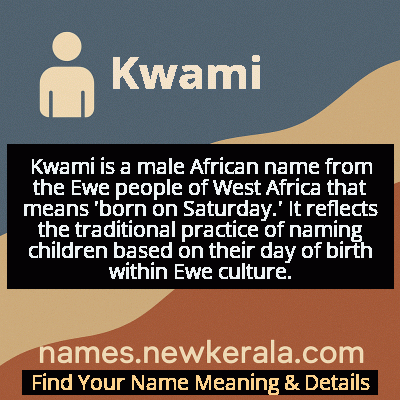Kwami Name Meaning & Details
Origin, Popularity, Numerology Analysis & Name Meaning of Kwami
Discover the origin, meaning, and cultural significance of the name KWAMI. Delve into its historical roots and explore the lasting impact it has had on communities and traditions.
Name
Kwami
Gender
Male
Origin
African
Lucky Number
3
Meaning of the Name - Kwami
Kwami is a male African name from the Ewe people of West Africa that means 'born on Saturday.' It reflects the traditional practice of naming children based on their day of birth within Ewe culture.
Kwami - Complete Numerology Analysis
Your Numerology Number
Based on Pythagorean Numerology System
Ruling Planet
Jupiter
Positive Nature
Optimistic, inspirational, and creative.
Negative Traits
Scattered, exaggerating.
Lucky Colours
Yellow, gold, purple.
Lucky Days
Thursday.
Lucky Stones
Yellow sapphire.
Harmony Numbers
1, 2, 9.
Best Suited Professions
Arts, writing, communication.
What People Like About You
Creativity, optimism.
Famous People Named Kwami
Kwami Coleman
Jazz musician and educator
Renowned jazz pianist and professor at The New School, known for innovative jazz compositions
Kwami Williams
Social entrepreneur
Co-founded MoringaConnect to empower smallholder farmers in Ghana through moringa cultivation
Kwami O. S. Alorvor
Academic and researcher
Notable Ghanaian scholar in environmental science and sustainable development
Kwami Leonard
Community leader
Influential diaspora community organizer promoting Ewe cultural preservation
Name Variations & International Equivalents
Click on blue names to explore their detailed meanings. Gray names with will be available soon.
Cultural & Historical Significance
This practice connects individuals to their ancestral traditions while embedding them within the cosmic order of their community. The name serves as a living testament to the preservation of indigenous knowledge systems despite centuries of colonial influence and modernization pressures. It represents continuity with ancestral practices while adapting to contemporary contexts, maintaining cultural identity across diaspora communities worldwide. The persistence of such naming conventions illustrates the resilience of African cultural practices and their importance in personal and collective identity formation.
Extended Personality Analysis
Individuals named Kwami are often perceived as possessing the traditional attributes associated with Saturday-born children in Ewe culture. They are typically described as ambitious, hardworking, and possessing strong leadership qualities, reflecting the cultural belief that Saturday-born individuals are destined for significant achievements. These personalities are thought to be grounded yet visionary, combining practical wisdom with innovative thinking.
Kwamis often demonstrate resilience in facing challenges and are respected for their determination and sense of responsibility. In social contexts, they are frequently seen as reliable community pillars who balance traditional values with modern perspectives. Their Saturday birth association suggests they carry the energy of completion and preparation for new beginnings, making them natural organizers and planners who can see projects through to fulfillment while maintaining harmonious relationships within their social circles. This cultural personality framework provides both identity formation and social expectations for those bearing the name.
Modern Usage & Popularity
In contemporary times, Kwami maintains strong usage within Ewe communities in West Africa while gaining recognition in diaspora populations across Europe and North America. The name has seen steady usage as African parents seek to preserve cultural heritage through traditional naming practices. Among educated urban populations, there's a resurgence of interest in day names like Kwami as symbols of cultural pride and identity reclamation. While not among the most common African names internationally, it appears with increasing frequency in multicultural societies, particularly among families with strong connections to Ghanaian or Togolese heritage. The name bridges traditional and modern contexts, serving both as a cultural marker and a distinctive personal identifier in global settings, reflecting the ongoing vitality of African naming traditions in the 21st century.
Symbolic & Spiritual Meanings
Symbolically, Kwami represents completion, wisdom, and preparation for new beginnings, drawing from the position of Saturday as the final day of the traditional week. The name carries connotations of grounding and stability, as Saturday-born individuals are believed to possess the accumulated wisdom of the week while preparing for renewal. It symbolizes the bridge between tradition and progress, embodying the idea that understanding one's origins provides strength for future endeavors. In metaphorical terms, Kwami suggests someone who carries the weight of cultural memory while moving forward with purpose and clarity. The name evokes images of strong foundations, cultural continuity, and the cyclical nature of time and human experience within African cosmological understanding, representing both personal identity and collective cultural heritage.

